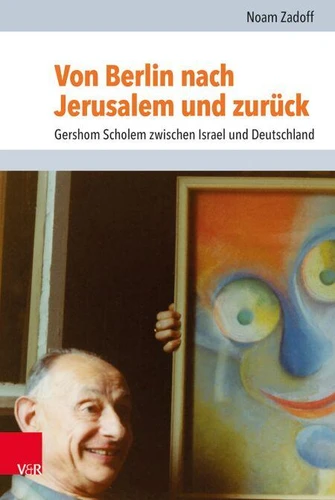Von Berlin nach Jerusalem und zurück. Gershom Scholem zwischen Israel und Deutschland
Par : , , ,Formats :
Disponible dans votre compte client Decitre ou Furet du Nord dès validation de votre commande. Le format PDF est :
- Compatible avec une lecture sur My Vivlio (smartphone, tablette, ordinateur)
- Compatible avec une lecture sur liseuses Vivlio
- Pour les liseuses autres que Vivlio, vous devez utiliser le logiciel Adobe Digital Edition. Non compatible avec la lecture sur les liseuses Kindle, Remarkable et Sony
 , qui est-ce ?
, qui est-ce ?Notre partenaire de plateforme de lecture numérique où vous retrouverez l'ensemble de vos ebooks gratuitement
Pour en savoir plus sur nos ebooks, consultez notre aide en ligne ici
- Nombre de pages416
- FormatPDF
- ISBN978-3-647-57035-8
- EAN9783647570358
- Date de parution06/04/2020
- Protection num.pas de protection
- Taille23 Mo
- Infos supplémentairespdf
- ÉditeurVandenhoeck & Ruprecht
Résumé
Although Gershom Scholem presented his life in his autobiography as a one way movement from Berlin to Jerusalem, a closer look in mainly unpublished documents reveals a different picture. Since the moment of his arrival in Palestine in 1923 and until his death in 1982 he remained in close contact to the German speaking cultural and intellectual worlds. In the 1920ies and 1930ies he contributed to the Hebrew and Jewish cultural circles in Berlin, and even after the shock of the Holocaust he gradually returned to shorter and longer visits in Germany.
In the postwar Federal Republic Scholem played a central role as a moral authority, who offered an alternative for young intellectuals to their corrupted father's generation. By doing so, the German-Israeli intellectual served as a generational link, bridging over the abyss created by the Holocaust. For Scholem himself this "return" was the outcome of a long process of disillusionment with his Zionist utopia.
In the postwar Federal Republic Scholem played a central role as a moral authority, who offered an alternative for young intellectuals to their corrupted father's generation. By doing so, the German-Israeli intellectual served as a generational link, bridging over the abyss created by the Holocaust. For Scholem himself this "return" was the outcome of a long process of disillusionment with his Zionist utopia.
Although Gershom Scholem presented his life in his autobiography as a one way movement from Berlin to Jerusalem, a closer look in mainly unpublished documents reveals a different picture. Since the moment of his arrival in Palestine in 1923 and until his death in 1982 he remained in close contact to the German speaking cultural and intellectual worlds. In the 1920ies and 1930ies he contributed to the Hebrew and Jewish cultural circles in Berlin, and even after the shock of the Holocaust he gradually returned to shorter and longer visits in Germany.
In the postwar Federal Republic Scholem played a central role as a moral authority, who offered an alternative for young intellectuals to their corrupted father's generation. By doing so, the German-Israeli intellectual served as a generational link, bridging over the abyss created by the Holocaust. For Scholem himself this "return" was the outcome of a long process of disillusionment with his Zionist utopia.
In the postwar Federal Republic Scholem played a central role as a moral authority, who offered an alternative for young intellectuals to their corrupted father's generation. By doing so, the German-Israeli intellectual served as a generational link, bridging over the abyss created by the Holocaust. For Scholem himself this "return" was the outcome of a long process of disillusionment with his Zionist utopia.



